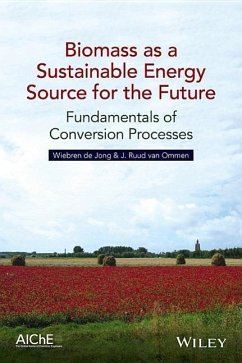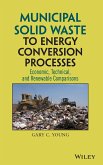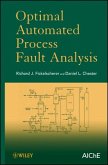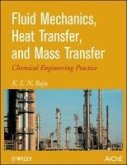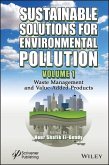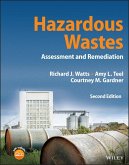Wiebren De Jong, J Ruud van Ommen
Biomass as a Sustainable Energy Source for the Future
Fundamentals of Conversion Processes
Wiebren De Jong, J Ruud van Ommen
Biomass as a Sustainable Energy Source for the Future
Fundamentals of Conversion Processes
- Gebundenes Buch
- Merkliste
- Auf die Merkliste
- Bewerten Bewerten
- Teilen
- Produkt teilen
- Produkterinnerung
- Produkterinnerung
Focuses on the conversion of biomass into gas or liquid fuels covering physical pre-treatment technologies, thermal, chemical and biochemical conversion technologies Most biomass energy is currently obtained by burning the biomaterial directly. Some of the common biomaterials used this way are wood, charcoal, sawdust, garbage etc. Biomass as a Sustainable Energy Source for the Future is not mainly concerned in using biomass directly, but rather converting it into gas, liquid or solid fuels in such a way that it is sustainable and non-polluting. Biomass as a Sustainable Energy Source for the…mehr
Andere Kunden interessierten sich auch für
![Municipal Solid Waste to Energy Conversion Processes Municipal Solid Waste to Energy Conversion Processes]() Gary C YoungMunicipal Solid Waste to Energy Conversion Processes117,99 €
Gary C YoungMunicipal Solid Waste to Energy Conversion Processes117,99 €![Optimal Automated Process Fault Analysis Optimal Automated Process Fault Analysis]() Richard J. FickelschererOptimal Automated Process Fault Analysis119,99 €
Richard J. FickelschererOptimal Automated Process Fault Analysis119,99 €![Fluid Mechanics, Heat Transfer, and Mass Transfer Fluid Mechanics, Heat Transfer, and Mass Transfer]() K S RajuFluid Mechanics, Heat Transfer, and Mass Transfer189,99 €
K S RajuFluid Mechanics, Heat Transfer, and Mass Transfer189,99 €![Physical and Chemical Processes in the Aquatic Environment Physical and Chemical Processes in the Aquatic Environment]() Erik R. ChristensenPhysical and Chemical Processes in the Aquatic Environment122,99 €
Erik R. ChristensenPhysical and Chemical Processes in the Aquatic Environment122,99 €![Sustainable Solutions for Environmental Pollution, Volume 1 Sustainable Solutions for Environmental Pollution, Volume 1]() Sustainable Solutions for Environmental Pollution, Volume 1232,99 €
Sustainable Solutions for Environmental Pollution, Volume 1232,99 €![Handbook Chlorination Disinfectants 5e Handbook Chlorination Disinfectants 5e]() Black & Veatch CorporationHandbook Chlorination Disinfectants 5e194,99 €
Black & Veatch CorporationHandbook Chlorination Disinfectants 5e194,99 €![Hazardous Wastes Hazardous Wastes]() Richard J. WattsHazardous Wastes134,99 €
Richard J. WattsHazardous Wastes134,99 €-
-
-
Focuses on the conversion of biomass into gas or liquid fuels covering physical pre-treatment technologies, thermal, chemical and biochemical conversion technologies Most biomass energy is currently obtained by burning the biomaterial directly. Some of the common biomaterials used this way are wood, charcoal, sawdust, garbage etc. Biomass as a Sustainable Energy Source for the Future is not mainly concerned in using biomass directly, but rather converting it into gas, liquid or solid fuels in such a way that it is sustainable and non-polluting. Biomass as a Sustainable Energy Source for the Future scope is not limited to one class of conversion technologies, as regularly seen in other books, but covers the current development and research of the key areas in biomass conversion such as: physical pre-treatment technologies, thermal, chemical and biochemical conversion technologies. Through contributions from leading experts in diverse fields, Biomass as a Sustainable Energy Source for the Future features: - The latest biomass characterization techniques - Diochemical and thermochemical conversion processes - The development of integrated biorefineries covering such topics as reactor configurations and downstream processing - How to mitigate the environmental risks when using biomass as fuel - Includes many problems, small projects, sample calculations and industrial application examples In addition this book discusses the development of integrated biorefineries, which are similar to petroleum refineries in concept, covering such topics as reactor configurations and downstream processing. The main difference between a petroleum refinery and a biorefinery is that the biorefinery uses biological matter as opposed to petroleum or other fossil sources to produce transportation fuels, chemicals, heat and power. Wiebren de Jong is an associate professor at Delft University of Technology working in the Process & Energy department. He is involved as senior researcher in several EU and national projects concerning biomass pretreatment, combustion, gasification and biorefinery processes. He is co-author of more than 65 journal papers concerning thermal and chemical conversion of biomass. J. Ruud van Ommen is an associate professor at Delft University of Technology working in the Chemical Engineering department. His current research focuses on Scaling up of nanotechnology processes, and monitoring and structuring of catalytic multiphase reactors, especially for energy related processes. He is co-author of more than 80 journal papers, of which about 25 concerning energy technology.
Hinweis: Dieser Artikel kann nur an eine deutsche Lieferadresse ausgeliefert werden.
Hinweis: Dieser Artikel kann nur an eine deutsche Lieferadresse ausgeliefert werden.
Produktdetails
- Produktdetails
- Verlag: Wiley
- Seitenzahl: 600
- Erscheinungstermin: 1. November 2014
- Englisch
- Abmessung: 236mm x 163mm x 36mm
- Gewicht: 930g
- ISBN-13: 9781118304914
- ISBN-10: 1118304918
- Artikelnr.: 40192460
- Herstellerkennzeichnung
- Libri GmbH
- Europaallee 1
- 36244 Bad Hersfeld
- gpsr@libri.de
- Verlag: Wiley
- Seitenzahl: 600
- Erscheinungstermin: 1. November 2014
- Englisch
- Abmessung: 236mm x 163mm x 36mm
- Gewicht: 930g
- ISBN-13: 9781118304914
- ISBN-10: 1118304918
- Artikelnr.: 40192460
- Herstellerkennzeichnung
- Libri GmbH
- Europaallee 1
- 36244 Bad Hersfeld
- gpsr@libri.de
Wiebren de Jong is an associate professor at Delft University of Technology working in the Process & Energy department. He is involved as senior researcher in several EU and national projects concerning biomass pretreatment, combustion, gasification and biorefinery processes. He is co-author of more than 65 journal papers concerning thermal and chemical conversion of biomass. J. Ruud van Ommen is an associate professor at Delft University of Technology working in the Chemical Engineering department. His current research focuses on Scaling up of nanotechnology processes, and monitoring and structuring of catalytic multiphase reactors, especially for energy related processes. He is co-author of more than 80 journal papers, of which about 25 concerning energy technology.
PREFACE xiii
ACKNOWLEDGMENTS xv
LIST OF CONTRIBUTORS xvii
PART I SOCIAL CONTEXT AND STRUCTURAL BASIS OF BIOMASS AS A RENEWABLE ENERGY
SOURCES 1
1 Introduction: Socioeconomic Aspects of Biomass Conversion 3
Wiebren de Jong and J. Ruud van Ommen
1.1 Energy Supply: Economic and Environmental Considerations 4
1.2 Ways to Mitigate Threats to a Sustainable Energy Supply 16
1.3 What is Sustainable Supply of Biomass? 20
1.4 Resources and Sustainable Potential of Biomass 25
1.5 A Brief Introduction to Multiproduct Biomass Conversion Techniques 29
Chapter Summary and Study Guide 30
Key Concepts 30
Short-Answer Questions 30
Problems 32
Projects 32
Internet References 33
References 33
2 Biomass Composition, Properties, and Characterization 36
Wiebren de Jong
2.1 Physicochemical Properties 37
2.2 Main Structural Organic Constituents 42
2.3 Minor Organic Constituents 45
2.4 Inorganic Compounds 49
2.5 Proximate and Ultimate Analysis 52
2.6 Heating Values 57
2.7 Ash Characterization Techniques 59
Chapter Summary and Study Guide 61
Key Concepts 62
Short-Answer Questions 62
Problems 63
Projects 65
Internet References 65
References 65
PART II CHEMICAL ENGINEERING PRINCIPLES OF BIOMASS PROCESSING 69
3 Conservation: Mass, Momentum, and Energy Balances 71
Wiebren de Jong
3.1 General Conservation Equation 73
3.2 Conservation of Mass 74
3.3 Conservation of Energy 80
3.4 Conservation of Momentum 90
Chapter Summary and Study Guide 92
Key Concepts 92
Short-Answer Questions 93
Problems 93
Projects 95
Internet Reference 96
References 96
4 Transfer: Basics of Mass and Heat Transfer 97
Dirk J.E.M. Roekaerts
4.1 Introduction 100
4.2 Transport Terms in the Governing Equations 100
4.3 Radiative Heat Transfer 103
4.4 Convective Heat and Mass Transfer 108
4.5 Transfer of Heat and Mass with Phase Change 110
Chapter Summary and Study Guide 124
Key Concepts 124
Short-Answer Questions 125
Problems 125
Projects 127
References 128
5 Reactions: Thermodynamic Aspects, Kinetics, and Catalysis 129
Martina Fantini, Wiebren de Jong, and J. Ruud van Ommen
5.1 Reaction Kinetics 130
5.2 Chemical Equilibrium 138
5.3 Catalysis 148
Chapter Summary and Study Guide 154
Key Concepts 155
Short-Answer Questions 155
Problems 155
Projects 156
References 158
6 Reactors: Idealized Chemical Reactors 159
Lilian de Martín and J. Ruud van Ommen
6.1 Preliminary Concepts 160
6.2 Batch Reactors (BRs) 163
6.3 Steady-State Continuous Stirred Tank Reactors (CSTRs) 167
6.4 Steady-State Plug Flow Reactors (PFRs) 168
6.5 Residence Time and Space Time for Flow Reactors 173
6.6 Deviations from Plug Flow and Perfect Mixing 176
Chapter Summary and Study Guide 180
Key Concepts 181
Short-Answer Questions 181
Problems 181
Project 182
References 183
7 Processes: Basics of Process Design 184
Johan Grievink, Pieter L.J. Swinkels, and J. Ruud van Ommen
7.1 Scope 186
7.2 Characterization of Biomass Processing 187
7.3 Analyzing the Outside of a Process 189
7.4 Analyzing the Inside of a Process 192
7.5 A Design Procedure for Biomass Conversion Processes 195
7.6 Interface with Supply Chain: Input-Output Diagram 201
7.7 Division in Subprocesses 206
7.8 Process Design: Functional Block Diagram 207
7.9 Example of Analysis and Evaluation in Process Design 212
7.10 Integrating Process Units into the Functional Network 222
7.11 Application Potential 224
Chapter Summary and Study Guide 224
Key Concepts 225
Short-Answer Questions 225
Problems 226
Projects 229
Internet References 229
References 229
PART III BIOMASS CONVERSION TECHNOLOGIES 231
8 Physical Pretreatment of Biomass 233
Wiebren de Jong
8.1 Introduction 235
8.2 Harvesting and Transport 236
8.3 Storage 241
8.4 Washing 242
8.5 Size Reduction 243
8.6 Particle Size Characterization 247
8.7 Screening and Classification 249
8.8 Methods of Moisture Reduction 249
8.9 Compaction Technologies 257
8.10 Sequencing the Pretreatment Steps 261
Chapter Summary and Study Guide 261
Key Concepts 261
Short-Answer Questions 262
Problems 263
Projects 264
Internet References 265
References 265
9 Thermochemical Conversion: Direct Combustion 268
Rob J.M. Bastiaans and Jeroen A. van Oijen
9.1 Introduction 270
9.2 Fundamental Conversion Processes 271
9.3 Particle Conversion Modes 273
9.4 Combustion Systems 283
9.5 Emissions 288
Chapter Summary and Study Guide 294
Key Concepts 295
Short-Answer Questions 295
Problems 295
Projects 296
Internet References 296
References 297
10 Thermochemical Conversion: (Co)gasification and Hydrothermal
Gasification 298
Sascha R.A. Kersten and Wiebren de Jong
10.1 What is Gasification? A Chemical and Engineering Background 300
10.2 A Short History of Gasification 317
10.3 (Co)gasification Technologies for Dry Biomass 318
10.4 Gasification in an Aqueous Environment: Hydrothermal Biomass
Conversion 329
10.5 Gas Cleaning for Biomass Gasification Processes 337
Chapter Summary and Study Guide 348
Key Concepts 348
Short-Answer Questions 349
Problems 350
Projects 353
Internet References 353
References 353
11 Thermochemical Conversion: An Introduction to Fast Pyrolysis 359
Stijn R.G. Oudenhoven and Sascha R.A. Kersten
11.1 Introduction 361
11.2 A First Look at a Liquefaction Process 362
11.3 A First Look at Fast Pyrolysis Oil 363
11.4 Chemistry and Kinetics of Pyrolysis 364
11.5 Processes at the Particle Level 368
11.6 A Closer Look at Pyrolysis Oil 371
11.7 Fast Pyrolysis Processes 374
11.8 Catalytic Pyrolysis 377
11.9 Oil Applications 378
11.10 Outlook 380
Appendix 11.1 Single-Particle Model (Based on the Model by Di Blasi, 1997)
380
Chapter Summary and Study Guide 383
Key Concepts 383
Short-Answer Questions 383
Problems 384
Projects 384
Internet References 385
References 385
12 Thermochemical Conversion: Torrefaction 388
Jaap H.A. Kiel, Arno H.H. Janssen, and Yash Joshi
12.1 Introduction 388
12.2 Fundamentals of Torrefaction 389
12.3 Advantages of Torrefaction 392
12.4 Torrefaction Technology 392
12.5 Torrefaction: An Enabling Technology 397
12.6 The Future of Torrefaction 398
Chapter Summary and Study Guide 399
Key Concepts 399
Short-Answer Questions 399
Problems 400
Projects 401
References 401
13 Biochemical Conversion: Biofuels by Industrial Fermentation 403
Maria C. Cuellar and Adrie J.J. Straathof
13.1 Introduction 404
13.2 First-Generation Bioethanol Processes 406
13.3 Second-Generation Bioethanol Processes 417
13.4 Butanol 428
13.5 Diesel-like Products 429
13.6 Stoichiometric and Thermodynamic Comparison of Fermentative Biofuels
432
13.7 Outlook 436
Chapter Summary and Study Guide 437
Key Concepts 438
Short-Answer Questions 438
Problems 438
Projects 439
References 439
14 Biochemical Conversion: Anaerobic Digestion 441
Robbert Kleerebezem
14.1 Introduction 442
14.2 Biochemical Fundamentals 443
14.3 Thermodynamic Fundamentals 453
14.4 Process Engineering 454
14.5 Outlook and Discussion 463
Chapter Summary and Study Guide 466
Key Concepts 466
Short-Answer Questions 466
Problems 467
Project 467
References 468
15 Biorefineries: Integration of Different Technologies 469
Wiebren de Jong
15.1 What is a Biorefinery and What is the Difference with an Oil Refinery?
470
15.2 Types of Biorefineries 474
15.3 Economic Considerations Evaluating Biorefinery Concepts: Basic Methods
for Assessing Investments and Cost Prices 481
15.4 Outlook to the Future of Biorefineries 492
Chapter Summary and Study Guide 493
Key Concepts 493
Short-Answer Questions 493
Problems 494
Projects 497
Internet References 500
References 500
PART IV END USES 503
16 High-Efficiency Energy Systems with Biomass Gasifiers and Solid Oxide
Fuel Cells 505
P.V. Aravind and Ming Liu
16.1 Introduction 506
16.2 Solid Oxide Fuel Cells 507
16.3 Biomass Gasifier-SOFC Combination 512
16.4 Concluding Remarks 520
Chapter Summary and Study Guide 520
Key Concepts 521
Short-Answer Questions 521
Problems 521
Projects 522
Internet References 522
References 523
17 Synthesis Gas Utilization for Transportation Fuel Production 525
J. Ruud van Ommen and Johan Grievink
17.1 Introduction 526
17.2 Fischer-Tropsch Synthesis 527
17.3 Synthetic Natural Gas Synthesis 535
17.4 Methanol Synthesis 537
17.5 Comparison of the Different Options 538
Chapter Summary and Study Guide 540
Key Concepts 540
Short-Answer Questions 541
Problems 541
Projects 544
Internet References 545
References 545
18 Chemistry of Biofuels and Biofuel Additives from Biomass 547
Isabel W.C.E. Arends
18.1 Introduction 548
18.2 Bioethanol and Biodiesel 548
18.3 Conversion of Sugars to Hydrocarbon Fuels 553
18.4 Greenness of the Conversion of Platform Molecules into Biobased Fuel
Additives 557
18.5 Direct Aqueous Reforming of Sugars Leading to a Range of Alkanes 564
18.6 Future Generations of Biofuel 566
Chapter Summary and Study Guide 566
Key Concepts 567
Short-Answer Questions 567
Problems 568
Projects 568
Internet References 568
References 569
INDEX 571
ACKNOWLEDGMENTS xv
LIST OF CONTRIBUTORS xvii
PART I SOCIAL CONTEXT AND STRUCTURAL BASIS OF BIOMASS AS A RENEWABLE ENERGY
SOURCES 1
1 Introduction: Socioeconomic Aspects of Biomass Conversion 3
Wiebren de Jong and J. Ruud van Ommen
1.1 Energy Supply: Economic and Environmental Considerations 4
1.2 Ways to Mitigate Threats to a Sustainable Energy Supply 16
1.3 What is Sustainable Supply of Biomass? 20
1.4 Resources and Sustainable Potential of Biomass 25
1.5 A Brief Introduction to Multiproduct Biomass Conversion Techniques 29
Chapter Summary and Study Guide 30
Key Concepts 30
Short-Answer Questions 30
Problems 32
Projects 32
Internet References 33
References 33
2 Biomass Composition, Properties, and Characterization 36
Wiebren de Jong
2.1 Physicochemical Properties 37
2.2 Main Structural Organic Constituents 42
2.3 Minor Organic Constituents 45
2.4 Inorganic Compounds 49
2.5 Proximate and Ultimate Analysis 52
2.6 Heating Values 57
2.7 Ash Characterization Techniques 59
Chapter Summary and Study Guide 61
Key Concepts 62
Short-Answer Questions 62
Problems 63
Projects 65
Internet References 65
References 65
PART II CHEMICAL ENGINEERING PRINCIPLES OF BIOMASS PROCESSING 69
3 Conservation: Mass, Momentum, and Energy Balances 71
Wiebren de Jong
3.1 General Conservation Equation 73
3.2 Conservation of Mass 74
3.3 Conservation of Energy 80
3.4 Conservation of Momentum 90
Chapter Summary and Study Guide 92
Key Concepts 92
Short-Answer Questions 93
Problems 93
Projects 95
Internet Reference 96
References 96
4 Transfer: Basics of Mass and Heat Transfer 97
Dirk J.E.M. Roekaerts
4.1 Introduction 100
4.2 Transport Terms in the Governing Equations 100
4.3 Radiative Heat Transfer 103
4.4 Convective Heat and Mass Transfer 108
4.5 Transfer of Heat and Mass with Phase Change 110
Chapter Summary and Study Guide 124
Key Concepts 124
Short-Answer Questions 125
Problems 125
Projects 127
References 128
5 Reactions: Thermodynamic Aspects, Kinetics, and Catalysis 129
Martina Fantini, Wiebren de Jong, and J. Ruud van Ommen
5.1 Reaction Kinetics 130
5.2 Chemical Equilibrium 138
5.3 Catalysis 148
Chapter Summary and Study Guide 154
Key Concepts 155
Short-Answer Questions 155
Problems 155
Projects 156
References 158
6 Reactors: Idealized Chemical Reactors 159
Lilian de Martín and J. Ruud van Ommen
6.1 Preliminary Concepts 160
6.2 Batch Reactors (BRs) 163
6.3 Steady-State Continuous Stirred Tank Reactors (CSTRs) 167
6.4 Steady-State Plug Flow Reactors (PFRs) 168
6.5 Residence Time and Space Time for Flow Reactors 173
6.6 Deviations from Plug Flow and Perfect Mixing 176
Chapter Summary and Study Guide 180
Key Concepts 181
Short-Answer Questions 181
Problems 181
Project 182
References 183
7 Processes: Basics of Process Design 184
Johan Grievink, Pieter L.J. Swinkels, and J. Ruud van Ommen
7.1 Scope 186
7.2 Characterization of Biomass Processing 187
7.3 Analyzing the Outside of a Process 189
7.4 Analyzing the Inside of a Process 192
7.5 A Design Procedure for Biomass Conversion Processes 195
7.6 Interface with Supply Chain: Input-Output Diagram 201
7.7 Division in Subprocesses 206
7.8 Process Design: Functional Block Diagram 207
7.9 Example of Analysis and Evaluation in Process Design 212
7.10 Integrating Process Units into the Functional Network 222
7.11 Application Potential 224
Chapter Summary and Study Guide 224
Key Concepts 225
Short-Answer Questions 225
Problems 226
Projects 229
Internet References 229
References 229
PART III BIOMASS CONVERSION TECHNOLOGIES 231
8 Physical Pretreatment of Biomass 233
Wiebren de Jong
8.1 Introduction 235
8.2 Harvesting and Transport 236
8.3 Storage 241
8.4 Washing 242
8.5 Size Reduction 243
8.6 Particle Size Characterization 247
8.7 Screening and Classification 249
8.8 Methods of Moisture Reduction 249
8.9 Compaction Technologies 257
8.10 Sequencing the Pretreatment Steps 261
Chapter Summary and Study Guide 261
Key Concepts 261
Short-Answer Questions 262
Problems 263
Projects 264
Internet References 265
References 265
9 Thermochemical Conversion: Direct Combustion 268
Rob J.M. Bastiaans and Jeroen A. van Oijen
9.1 Introduction 270
9.2 Fundamental Conversion Processes 271
9.3 Particle Conversion Modes 273
9.4 Combustion Systems 283
9.5 Emissions 288
Chapter Summary and Study Guide 294
Key Concepts 295
Short-Answer Questions 295
Problems 295
Projects 296
Internet References 296
References 297
10 Thermochemical Conversion: (Co)gasification and Hydrothermal
Gasification 298
Sascha R.A. Kersten and Wiebren de Jong
10.1 What is Gasification? A Chemical and Engineering Background 300
10.2 A Short History of Gasification 317
10.3 (Co)gasification Technologies for Dry Biomass 318
10.4 Gasification in an Aqueous Environment: Hydrothermal Biomass
Conversion 329
10.5 Gas Cleaning for Biomass Gasification Processes 337
Chapter Summary and Study Guide 348
Key Concepts 348
Short-Answer Questions 349
Problems 350
Projects 353
Internet References 353
References 353
11 Thermochemical Conversion: An Introduction to Fast Pyrolysis 359
Stijn R.G. Oudenhoven and Sascha R.A. Kersten
11.1 Introduction 361
11.2 A First Look at a Liquefaction Process 362
11.3 A First Look at Fast Pyrolysis Oil 363
11.4 Chemistry and Kinetics of Pyrolysis 364
11.5 Processes at the Particle Level 368
11.6 A Closer Look at Pyrolysis Oil 371
11.7 Fast Pyrolysis Processes 374
11.8 Catalytic Pyrolysis 377
11.9 Oil Applications 378
11.10 Outlook 380
Appendix 11.1 Single-Particle Model (Based on the Model by Di Blasi, 1997)
380
Chapter Summary and Study Guide 383
Key Concepts 383
Short-Answer Questions 383
Problems 384
Projects 384
Internet References 385
References 385
12 Thermochemical Conversion: Torrefaction 388
Jaap H.A. Kiel, Arno H.H. Janssen, and Yash Joshi
12.1 Introduction 388
12.2 Fundamentals of Torrefaction 389
12.3 Advantages of Torrefaction 392
12.4 Torrefaction Technology 392
12.5 Torrefaction: An Enabling Technology 397
12.6 The Future of Torrefaction 398
Chapter Summary and Study Guide 399
Key Concepts 399
Short-Answer Questions 399
Problems 400
Projects 401
References 401
13 Biochemical Conversion: Biofuels by Industrial Fermentation 403
Maria C. Cuellar and Adrie J.J. Straathof
13.1 Introduction 404
13.2 First-Generation Bioethanol Processes 406
13.3 Second-Generation Bioethanol Processes 417
13.4 Butanol 428
13.5 Diesel-like Products 429
13.6 Stoichiometric and Thermodynamic Comparison of Fermentative Biofuels
432
13.7 Outlook 436
Chapter Summary and Study Guide 437
Key Concepts 438
Short-Answer Questions 438
Problems 438
Projects 439
References 439
14 Biochemical Conversion: Anaerobic Digestion 441
Robbert Kleerebezem
14.1 Introduction 442
14.2 Biochemical Fundamentals 443
14.3 Thermodynamic Fundamentals 453
14.4 Process Engineering 454
14.5 Outlook and Discussion 463
Chapter Summary and Study Guide 466
Key Concepts 466
Short-Answer Questions 466
Problems 467
Project 467
References 468
15 Biorefineries: Integration of Different Technologies 469
Wiebren de Jong
15.1 What is a Biorefinery and What is the Difference with an Oil Refinery?
470
15.2 Types of Biorefineries 474
15.3 Economic Considerations Evaluating Biorefinery Concepts: Basic Methods
for Assessing Investments and Cost Prices 481
15.4 Outlook to the Future of Biorefineries 492
Chapter Summary and Study Guide 493
Key Concepts 493
Short-Answer Questions 493
Problems 494
Projects 497
Internet References 500
References 500
PART IV END USES 503
16 High-Efficiency Energy Systems with Biomass Gasifiers and Solid Oxide
Fuel Cells 505
P.V. Aravind and Ming Liu
16.1 Introduction 506
16.2 Solid Oxide Fuel Cells 507
16.3 Biomass Gasifier-SOFC Combination 512
16.4 Concluding Remarks 520
Chapter Summary and Study Guide 520
Key Concepts 521
Short-Answer Questions 521
Problems 521
Projects 522
Internet References 522
References 523
17 Synthesis Gas Utilization for Transportation Fuel Production 525
J. Ruud van Ommen and Johan Grievink
17.1 Introduction 526
17.2 Fischer-Tropsch Synthesis 527
17.3 Synthetic Natural Gas Synthesis 535
17.4 Methanol Synthesis 537
17.5 Comparison of the Different Options 538
Chapter Summary and Study Guide 540
Key Concepts 540
Short-Answer Questions 541
Problems 541
Projects 544
Internet References 545
References 545
18 Chemistry of Biofuels and Biofuel Additives from Biomass 547
Isabel W.C.E. Arends
18.1 Introduction 548
18.2 Bioethanol and Biodiesel 548
18.3 Conversion of Sugars to Hydrocarbon Fuels 553
18.4 Greenness of the Conversion of Platform Molecules into Biobased Fuel
Additives 557
18.5 Direct Aqueous Reforming of Sugars Leading to a Range of Alkanes 564
18.6 Future Generations of Biofuel 566
Chapter Summary and Study Guide 566
Key Concepts 567
Short-Answer Questions 567
Problems 568
Projects 568
Internet References 568
References 569
INDEX 571
PREFACE xiii
ACKNOWLEDGMENTS xv
LIST OF CONTRIBUTORS xvii
PART I SOCIAL CONTEXT AND STRUCTURAL BASIS OF BIOMASS AS A RENEWABLE ENERGY
SOURCES 1
1 Introduction: Socioeconomic Aspects of Biomass Conversion 3
Wiebren de Jong and J. Ruud van Ommen
1.1 Energy Supply: Economic and Environmental Considerations 4
1.2 Ways to Mitigate Threats to a Sustainable Energy Supply 16
1.3 What is Sustainable Supply of Biomass? 20
1.4 Resources and Sustainable Potential of Biomass 25
1.5 A Brief Introduction to Multiproduct Biomass Conversion Techniques 29
Chapter Summary and Study Guide 30
Key Concepts 30
Short-Answer Questions 30
Problems 32
Projects 32
Internet References 33
References 33
2 Biomass Composition, Properties, and Characterization 36
Wiebren de Jong
2.1 Physicochemical Properties 37
2.2 Main Structural Organic Constituents 42
2.3 Minor Organic Constituents 45
2.4 Inorganic Compounds 49
2.5 Proximate and Ultimate Analysis 52
2.6 Heating Values 57
2.7 Ash Characterization Techniques 59
Chapter Summary and Study Guide 61
Key Concepts 62
Short-Answer Questions 62
Problems 63
Projects 65
Internet References 65
References 65
PART II CHEMICAL ENGINEERING PRINCIPLES OF BIOMASS PROCESSING 69
3 Conservation: Mass, Momentum, and Energy Balances 71
Wiebren de Jong
3.1 General Conservation Equation 73
3.2 Conservation of Mass 74
3.3 Conservation of Energy 80
3.4 Conservation of Momentum 90
Chapter Summary and Study Guide 92
Key Concepts 92
Short-Answer Questions 93
Problems 93
Projects 95
Internet Reference 96
References 96
4 Transfer: Basics of Mass and Heat Transfer 97
Dirk J.E.M. Roekaerts
4.1 Introduction 100
4.2 Transport Terms in the Governing Equations 100
4.3 Radiative Heat Transfer 103
4.4 Convective Heat and Mass Transfer 108
4.5 Transfer of Heat and Mass with Phase Change 110
Chapter Summary and Study Guide 124
Key Concepts 124
Short-Answer Questions 125
Problems 125
Projects 127
References 128
5 Reactions: Thermodynamic Aspects, Kinetics, and Catalysis 129
Martina Fantini, Wiebren de Jong, and J. Ruud van Ommen
5.1 Reaction Kinetics 130
5.2 Chemical Equilibrium 138
5.3 Catalysis 148
Chapter Summary and Study Guide 154
Key Concepts 155
Short-Answer Questions 155
Problems 155
Projects 156
References 158
6 Reactors: Idealized Chemical Reactors 159
Lilian de Martín and J. Ruud van Ommen
6.1 Preliminary Concepts 160
6.2 Batch Reactors (BRs) 163
6.3 Steady-State Continuous Stirred Tank Reactors (CSTRs) 167
6.4 Steady-State Plug Flow Reactors (PFRs) 168
6.5 Residence Time and Space Time for Flow Reactors 173
6.6 Deviations from Plug Flow and Perfect Mixing 176
Chapter Summary and Study Guide 180
Key Concepts 181
Short-Answer Questions 181
Problems 181
Project 182
References 183
7 Processes: Basics of Process Design 184
Johan Grievink, Pieter L.J. Swinkels, and J. Ruud van Ommen
7.1 Scope 186
7.2 Characterization of Biomass Processing 187
7.3 Analyzing the Outside of a Process 189
7.4 Analyzing the Inside of a Process 192
7.5 A Design Procedure for Biomass Conversion Processes 195
7.6 Interface with Supply Chain: Input-Output Diagram 201
7.7 Division in Subprocesses 206
7.8 Process Design: Functional Block Diagram 207
7.9 Example of Analysis and Evaluation in Process Design 212
7.10 Integrating Process Units into the Functional Network 222
7.11 Application Potential 224
Chapter Summary and Study Guide 224
Key Concepts 225
Short-Answer Questions 225
Problems 226
Projects 229
Internet References 229
References 229
PART III BIOMASS CONVERSION TECHNOLOGIES 231
8 Physical Pretreatment of Biomass 233
Wiebren de Jong
8.1 Introduction 235
8.2 Harvesting and Transport 236
8.3 Storage 241
8.4 Washing 242
8.5 Size Reduction 243
8.6 Particle Size Characterization 247
8.7 Screening and Classification 249
8.8 Methods of Moisture Reduction 249
8.9 Compaction Technologies 257
8.10 Sequencing the Pretreatment Steps 261
Chapter Summary and Study Guide 261
Key Concepts 261
Short-Answer Questions 262
Problems 263
Projects 264
Internet References 265
References 265
9 Thermochemical Conversion: Direct Combustion 268
Rob J.M. Bastiaans and Jeroen A. van Oijen
9.1 Introduction 270
9.2 Fundamental Conversion Processes 271
9.3 Particle Conversion Modes 273
9.4 Combustion Systems 283
9.5 Emissions 288
Chapter Summary and Study Guide 294
Key Concepts 295
Short-Answer Questions 295
Problems 295
Projects 296
Internet References 296
References 297
10 Thermochemical Conversion: (Co)gasification and Hydrothermal
Gasification 298
Sascha R.A. Kersten and Wiebren de Jong
10.1 What is Gasification? A Chemical and Engineering Background 300
10.2 A Short History of Gasification 317
10.3 (Co)gasification Technologies for Dry Biomass 318
10.4 Gasification in an Aqueous Environment: Hydrothermal Biomass
Conversion 329
10.5 Gas Cleaning for Biomass Gasification Processes 337
Chapter Summary and Study Guide 348
Key Concepts 348
Short-Answer Questions 349
Problems 350
Projects 353
Internet References 353
References 353
11 Thermochemical Conversion: An Introduction to Fast Pyrolysis 359
Stijn R.G. Oudenhoven and Sascha R.A. Kersten
11.1 Introduction 361
11.2 A First Look at a Liquefaction Process 362
11.3 A First Look at Fast Pyrolysis Oil 363
11.4 Chemistry and Kinetics of Pyrolysis 364
11.5 Processes at the Particle Level 368
11.6 A Closer Look at Pyrolysis Oil 371
11.7 Fast Pyrolysis Processes 374
11.8 Catalytic Pyrolysis 377
11.9 Oil Applications 378
11.10 Outlook 380
Appendix 11.1 Single-Particle Model (Based on the Model by Di Blasi, 1997)
380
Chapter Summary and Study Guide 383
Key Concepts 383
Short-Answer Questions 383
Problems 384
Projects 384
Internet References 385
References 385
12 Thermochemical Conversion: Torrefaction 388
Jaap H.A. Kiel, Arno H.H. Janssen, and Yash Joshi
12.1 Introduction 388
12.2 Fundamentals of Torrefaction 389
12.3 Advantages of Torrefaction 392
12.4 Torrefaction Technology 392
12.5 Torrefaction: An Enabling Technology 397
12.6 The Future of Torrefaction 398
Chapter Summary and Study Guide 399
Key Concepts 399
Short-Answer Questions 399
Problems 400
Projects 401
References 401
13 Biochemical Conversion: Biofuels by Industrial Fermentation 403
Maria C. Cuellar and Adrie J.J. Straathof
13.1 Introduction 404
13.2 First-Generation Bioethanol Processes 406
13.3 Second-Generation Bioethanol Processes 417
13.4 Butanol 428
13.5 Diesel-like Products 429
13.6 Stoichiometric and Thermodynamic Comparison of Fermentative Biofuels
432
13.7 Outlook 436
Chapter Summary and Study Guide 437
Key Concepts 438
Short-Answer Questions 438
Problems 438
Projects 439
References 439
14 Biochemical Conversion: Anaerobic Digestion 441
Robbert Kleerebezem
14.1 Introduction 442
14.2 Biochemical Fundamentals 443
14.3 Thermodynamic Fundamentals 453
14.4 Process Engineering 454
14.5 Outlook and Discussion 463
Chapter Summary and Study Guide 466
Key Concepts 466
Short-Answer Questions 466
Problems 467
Project 467
References 468
15 Biorefineries: Integration of Different Technologies 469
Wiebren de Jong
15.1 What is a Biorefinery and What is the Difference with an Oil Refinery?
470
15.2 Types of Biorefineries 474
15.3 Economic Considerations Evaluating Biorefinery Concepts: Basic Methods
for Assessing Investments and Cost Prices 481
15.4 Outlook to the Future of Biorefineries 492
Chapter Summary and Study Guide 493
Key Concepts 493
Short-Answer Questions 493
Problems 494
Projects 497
Internet References 500
References 500
PART IV END USES 503
16 High-Efficiency Energy Systems with Biomass Gasifiers and Solid Oxide
Fuel Cells 505
P.V. Aravind and Ming Liu
16.1 Introduction 506
16.2 Solid Oxide Fuel Cells 507
16.3 Biomass Gasifier-SOFC Combination 512
16.4 Concluding Remarks 520
Chapter Summary and Study Guide 520
Key Concepts 521
Short-Answer Questions 521
Problems 521
Projects 522
Internet References 522
References 523
17 Synthesis Gas Utilization for Transportation Fuel Production 525
J. Ruud van Ommen and Johan Grievink
17.1 Introduction 526
17.2 Fischer-Tropsch Synthesis 527
17.3 Synthetic Natural Gas Synthesis 535
17.4 Methanol Synthesis 537
17.5 Comparison of the Different Options 538
Chapter Summary and Study Guide 540
Key Concepts 540
Short-Answer Questions 541
Problems 541
Projects 544
Internet References 545
References 545
18 Chemistry of Biofuels and Biofuel Additives from Biomass 547
Isabel W.C.E. Arends
18.1 Introduction 548
18.2 Bioethanol and Biodiesel 548
18.3 Conversion of Sugars to Hydrocarbon Fuels 553
18.4 Greenness of the Conversion of Platform Molecules into Biobased Fuel
Additives 557
18.5 Direct Aqueous Reforming of Sugars Leading to a Range of Alkanes 564
18.6 Future Generations of Biofuel 566
Chapter Summary and Study Guide 566
Key Concepts 567
Short-Answer Questions 567
Problems 568
Projects 568
Internet References 568
References 569
INDEX 571
ACKNOWLEDGMENTS xv
LIST OF CONTRIBUTORS xvii
PART I SOCIAL CONTEXT AND STRUCTURAL BASIS OF BIOMASS AS A RENEWABLE ENERGY
SOURCES 1
1 Introduction: Socioeconomic Aspects of Biomass Conversion 3
Wiebren de Jong and J. Ruud van Ommen
1.1 Energy Supply: Economic and Environmental Considerations 4
1.2 Ways to Mitigate Threats to a Sustainable Energy Supply 16
1.3 What is Sustainable Supply of Biomass? 20
1.4 Resources and Sustainable Potential of Biomass 25
1.5 A Brief Introduction to Multiproduct Biomass Conversion Techniques 29
Chapter Summary and Study Guide 30
Key Concepts 30
Short-Answer Questions 30
Problems 32
Projects 32
Internet References 33
References 33
2 Biomass Composition, Properties, and Characterization 36
Wiebren de Jong
2.1 Physicochemical Properties 37
2.2 Main Structural Organic Constituents 42
2.3 Minor Organic Constituents 45
2.4 Inorganic Compounds 49
2.5 Proximate and Ultimate Analysis 52
2.6 Heating Values 57
2.7 Ash Characterization Techniques 59
Chapter Summary and Study Guide 61
Key Concepts 62
Short-Answer Questions 62
Problems 63
Projects 65
Internet References 65
References 65
PART II CHEMICAL ENGINEERING PRINCIPLES OF BIOMASS PROCESSING 69
3 Conservation: Mass, Momentum, and Energy Balances 71
Wiebren de Jong
3.1 General Conservation Equation 73
3.2 Conservation of Mass 74
3.3 Conservation of Energy 80
3.4 Conservation of Momentum 90
Chapter Summary and Study Guide 92
Key Concepts 92
Short-Answer Questions 93
Problems 93
Projects 95
Internet Reference 96
References 96
4 Transfer: Basics of Mass and Heat Transfer 97
Dirk J.E.M. Roekaerts
4.1 Introduction 100
4.2 Transport Terms in the Governing Equations 100
4.3 Radiative Heat Transfer 103
4.4 Convective Heat and Mass Transfer 108
4.5 Transfer of Heat and Mass with Phase Change 110
Chapter Summary and Study Guide 124
Key Concepts 124
Short-Answer Questions 125
Problems 125
Projects 127
References 128
5 Reactions: Thermodynamic Aspects, Kinetics, and Catalysis 129
Martina Fantini, Wiebren de Jong, and J. Ruud van Ommen
5.1 Reaction Kinetics 130
5.2 Chemical Equilibrium 138
5.3 Catalysis 148
Chapter Summary and Study Guide 154
Key Concepts 155
Short-Answer Questions 155
Problems 155
Projects 156
References 158
6 Reactors: Idealized Chemical Reactors 159
Lilian de Martín and J. Ruud van Ommen
6.1 Preliminary Concepts 160
6.2 Batch Reactors (BRs) 163
6.3 Steady-State Continuous Stirred Tank Reactors (CSTRs) 167
6.4 Steady-State Plug Flow Reactors (PFRs) 168
6.5 Residence Time and Space Time for Flow Reactors 173
6.6 Deviations from Plug Flow and Perfect Mixing 176
Chapter Summary and Study Guide 180
Key Concepts 181
Short-Answer Questions 181
Problems 181
Project 182
References 183
7 Processes: Basics of Process Design 184
Johan Grievink, Pieter L.J. Swinkels, and J. Ruud van Ommen
7.1 Scope 186
7.2 Characterization of Biomass Processing 187
7.3 Analyzing the Outside of a Process 189
7.4 Analyzing the Inside of a Process 192
7.5 A Design Procedure for Biomass Conversion Processes 195
7.6 Interface with Supply Chain: Input-Output Diagram 201
7.7 Division in Subprocesses 206
7.8 Process Design: Functional Block Diagram 207
7.9 Example of Analysis and Evaluation in Process Design 212
7.10 Integrating Process Units into the Functional Network 222
7.11 Application Potential 224
Chapter Summary and Study Guide 224
Key Concepts 225
Short-Answer Questions 225
Problems 226
Projects 229
Internet References 229
References 229
PART III BIOMASS CONVERSION TECHNOLOGIES 231
8 Physical Pretreatment of Biomass 233
Wiebren de Jong
8.1 Introduction 235
8.2 Harvesting and Transport 236
8.3 Storage 241
8.4 Washing 242
8.5 Size Reduction 243
8.6 Particle Size Characterization 247
8.7 Screening and Classification 249
8.8 Methods of Moisture Reduction 249
8.9 Compaction Technologies 257
8.10 Sequencing the Pretreatment Steps 261
Chapter Summary and Study Guide 261
Key Concepts 261
Short-Answer Questions 262
Problems 263
Projects 264
Internet References 265
References 265
9 Thermochemical Conversion: Direct Combustion 268
Rob J.M. Bastiaans and Jeroen A. van Oijen
9.1 Introduction 270
9.2 Fundamental Conversion Processes 271
9.3 Particle Conversion Modes 273
9.4 Combustion Systems 283
9.5 Emissions 288
Chapter Summary and Study Guide 294
Key Concepts 295
Short-Answer Questions 295
Problems 295
Projects 296
Internet References 296
References 297
10 Thermochemical Conversion: (Co)gasification and Hydrothermal
Gasification 298
Sascha R.A. Kersten and Wiebren de Jong
10.1 What is Gasification? A Chemical and Engineering Background 300
10.2 A Short History of Gasification 317
10.3 (Co)gasification Technologies for Dry Biomass 318
10.4 Gasification in an Aqueous Environment: Hydrothermal Biomass
Conversion 329
10.5 Gas Cleaning for Biomass Gasification Processes 337
Chapter Summary and Study Guide 348
Key Concepts 348
Short-Answer Questions 349
Problems 350
Projects 353
Internet References 353
References 353
11 Thermochemical Conversion: An Introduction to Fast Pyrolysis 359
Stijn R.G. Oudenhoven and Sascha R.A. Kersten
11.1 Introduction 361
11.2 A First Look at a Liquefaction Process 362
11.3 A First Look at Fast Pyrolysis Oil 363
11.4 Chemistry and Kinetics of Pyrolysis 364
11.5 Processes at the Particle Level 368
11.6 A Closer Look at Pyrolysis Oil 371
11.7 Fast Pyrolysis Processes 374
11.8 Catalytic Pyrolysis 377
11.9 Oil Applications 378
11.10 Outlook 380
Appendix 11.1 Single-Particle Model (Based on the Model by Di Blasi, 1997)
380
Chapter Summary and Study Guide 383
Key Concepts 383
Short-Answer Questions 383
Problems 384
Projects 384
Internet References 385
References 385
12 Thermochemical Conversion: Torrefaction 388
Jaap H.A. Kiel, Arno H.H. Janssen, and Yash Joshi
12.1 Introduction 388
12.2 Fundamentals of Torrefaction 389
12.3 Advantages of Torrefaction 392
12.4 Torrefaction Technology 392
12.5 Torrefaction: An Enabling Technology 397
12.6 The Future of Torrefaction 398
Chapter Summary and Study Guide 399
Key Concepts 399
Short-Answer Questions 399
Problems 400
Projects 401
References 401
13 Biochemical Conversion: Biofuels by Industrial Fermentation 403
Maria C. Cuellar and Adrie J.J. Straathof
13.1 Introduction 404
13.2 First-Generation Bioethanol Processes 406
13.3 Second-Generation Bioethanol Processes 417
13.4 Butanol 428
13.5 Diesel-like Products 429
13.6 Stoichiometric and Thermodynamic Comparison of Fermentative Biofuels
432
13.7 Outlook 436
Chapter Summary and Study Guide 437
Key Concepts 438
Short-Answer Questions 438
Problems 438
Projects 439
References 439
14 Biochemical Conversion: Anaerobic Digestion 441
Robbert Kleerebezem
14.1 Introduction 442
14.2 Biochemical Fundamentals 443
14.3 Thermodynamic Fundamentals 453
14.4 Process Engineering 454
14.5 Outlook and Discussion 463
Chapter Summary and Study Guide 466
Key Concepts 466
Short-Answer Questions 466
Problems 467
Project 467
References 468
15 Biorefineries: Integration of Different Technologies 469
Wiebren de Jong
15.1 What is a Biorefinery and What is the Difference with an Oil Refinery?
470
15.2 Types of Biorefineries 474
15.3 Economic Considerations Evaluating Biorefinery Concepts: Basic Methods
for Assessing Investments and Cost Prices 481
15.4 Outlook to the Future of Biorefineries 492
Chapter Summary and Study Guide 493
Key Concepts 493
Short-Answer Questions 493
Problems 494
Projects 497
Internet References 500
References 500
PART IV END USES 503
16 High-Efficiency Energy Systems with Biomass Gasifiers and Solid Oxide
Fuel Cells 505
P.V. Aravind and Ming Liu
16.1 Introduction 506
16.2 Solid Oxide Fuel Cells 507
16.3 Biomass Gasifier-SOFC Combination 512
16.4 Concluding Remarks 520
Chapter Summary and Study Guide 520
Key Concepts 521
Short-Answer Questions 521
Problems 521
Projects 522
Internet References 522
References 523
17 Synthesis Gas Utilization for Transportation Fuel Production 525
J. Ruud van Ommen and Johan Grievink
17.1 Introduction 526
17.2 Fischer-Tropsch Synthesis 527
17.3 Synthetic Natural Gas Synthesis 535
17.4 Methanol Synthesis 537
17.5 Comparison of the Different Options 538
Chapter Summary and Study Guide 540
Key Concepts 540
Short-Answer Questions 541
Problems 541
Projects 544
Internet References 545
References 545
18 Chemistry of Biofuels and Biofuel Additives from Biomass 547
Isabel W.C.E. Arends
18.1 Introduction 548
18.2 Bioethanol and Biodiesel 548
18.3 Conversion of Sugars to Hydrocarbon Fuels 553
18.4 Greenness of the Conversion of Platform Molecules into Biobased Fuel
Additives 557
18.5 Direct Aqueous Reforming of Sugars Leading to a Range of Alkanes 564
18.6 Future Generations of Biofuel 566
Chapter Summary and Study Guide 566
Key Concepts 567
Short-Answer Questions 567
Problems 568
Projects 568
Internet References 568
References 569
INDEX 571

